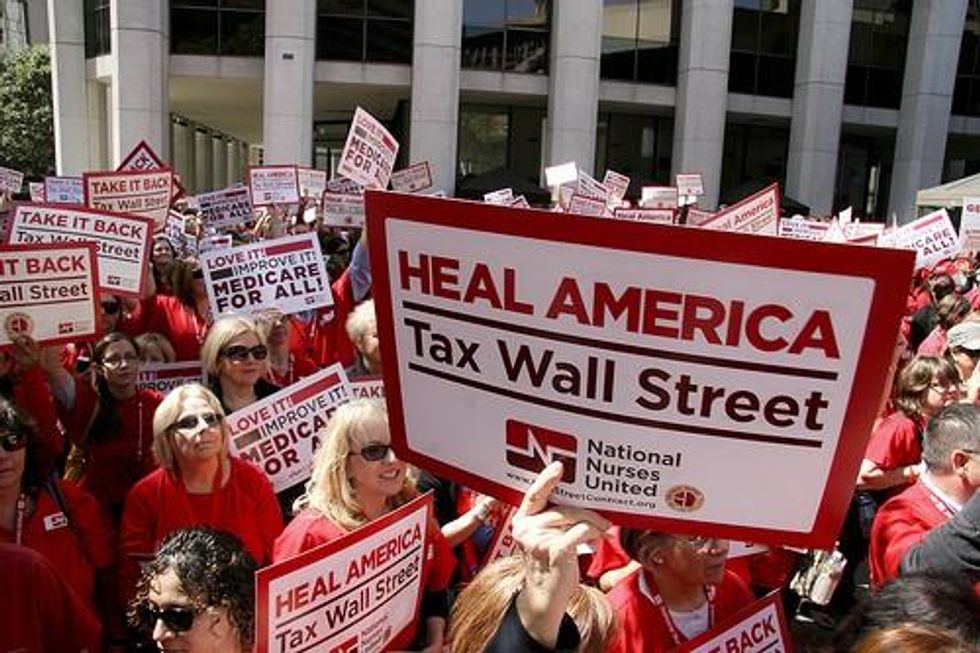On the eve of Occupy Wall Street's first anniversary, Congressman Keith Ellison introduced a much-needed common sense bill: HR 6411, the Inclusive Prosperity Act. The bill taxes financial transactions to generate revenue for social needs. Amid our consensus-narrowed, deficit-obsessed political debate, it's a call to arms, and a breath of fresh air.
As I've often argued, a financial transaction tax is deeply pragmatic, broadly popular and sorely needed. At a time when budget slashing is a bipartisan obsession, it offers vital revenue. As we struggle to escape the recession wrought by the 1 percent, it presents a simple solution to discourage speculation. As progressives fight too many defensive battles, the financial transaction tax presents an urgent opportunity to go on offense.
Victory won't come easy. Sarah Anderson, who directs the Global Economy Project at the Institute for Policy Studies, notes that "Obama's communications director was asked about this at a press event during the convention and didn't get an enthusiastic response. So that was a disappointing moment."
But the FTT would never have made it thus far without sustained and savvy organizing. Groups like National Nurses United, National People's Action, and Health GAP have been tenacious in forcing the FTT onto the agenda. Their European counterparts have forged a critical mass of support within the EU. And they're backed on both sides of the pond by a slew of economists and financial professionals who wield common sense against Chicken Little lobbyists.
"I think people are really touched by how much passion there is around this issue," says Anderson, "and the fact that they're drawing such diverse groups together around this tax idea."
Ellison's bill would raise up to $350 billion through a small tax on stock, bond, derivative and currency trading.
According to a statement from Ellison's office, the revenue could go to programs including infrastructure, job creation and global health. Congressman Ellison noted that:
The American public provided hundreds of billions to bailout Wall Street during the global fiscal crisis yet bore the brunt of the crisis with lost jobs and reduced household wealth. This is a phenomenally wealthy nation, yet our tax and regulatory system allowed the financial titans to amass great riches while impoverishing the systems that enable inclusive prosperity.
Ellison has it right: America isn't broke. And the poor and the middle class aren't the ones we should be looking to for sacrifice.
While other bills including an FTT have been introduced, Anderson says, "One reason that I see this one as significant is that the bill is in sync with the broader international campaign for financial transaction taxes, in that it specifically mentions climate and global health programs," among the uses for new revenue. That international movement now faces a key test: Reaching formal agreement from at least nine EU countries on a joint FTT.
While ten nations have expressed support for the concept, Anderson says there's "a lot of jockeying going on" now regarding whether derivatives will be included, and whether the FTT will be tied to a deal on debt in Spain and Italy. A deal could come as soon as December, or stretch into next year.
Ellison's bill also comes at a crucial time for US politics. With weeks left until the presidential election, and a "fiscal cliff" showdown following close on its heels, the calls for an austerity-lite "grand bargain" are reaching a fever pitch. Among the latest symptoms of deficit madness: the growing chorus suggesting that Erskine Bowles, deficit panel co-chair and top austerity advocate, is a frontrunner for Treasury Secretary in a second Obama term. Top Democrats--up to and including the president himself--keep talking up their willingness to cut social insurance. As economist Dean Baker wrote recently, with CEOs already gathering to plan a political assault on these programs regardless of who wins the election, "The question is whether this juggernaut can be stopped?... The question is how to make it so that popular sentiment overrides the big bucks of the corporate chieftains."
In an interview this week with The Huffington Post, Vermont Senator Bernie Sanders warned that "unless we stop it," there will be a deal soon after the election to reduce cost of living increases for Social Security.
There is a better way than austerity. The Congressional Progressive Caucus, led by Ellison and Congressman Raul Grijalva, has offered a "Budget for All": tax the top 2 percent, cut unneeded defense programs, and preserve Social Security, Medicare and Medicaid. The FTT is a great place to start.
For more on the Republican austerity threat, check out Nationcoverage of the Senate candidate proposing to "do away" with Medicare and Medicaid.
